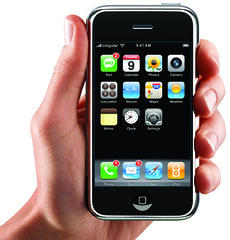
“The way we see the problem is the problem.” — Stephen R. Covey
Believe it or not, AT&T doesn't have a network problem. Not really. What it has is an increasingly critical public relations problem. And until it sees public relations as the real problem, things won't get much better.
Bob Geller was among the first to call it so, citing an article that confirms AT&T's throughput is 40 to 50 percent higher than the competition, had faster average download speeds, and signal strength of 75 percent or better more frequently. Most challenges are simply related to the adoption rates of data hungry consumers.
And yet, AT&T's strategy in the AT&T-Verizon smackdown continues to aim at censoring the Verizon message as much as it wants its own message out there. The latest attempt included purchasing two day-long "netblocks" across the entire Time Warner cable division. Sites included CNN, TBS.com, TNT.tv, NBA.com, Nascar.com, SmokingGun.com, and AdultSwim.com. The "netblock" buy was a step up from the ill-advised lawsuit, but not by much.
Even more telling than the actions of AT&T is how people react to what it says. When Ralph de la Vega, president of AT&T Mobility, framed up the company's challenge to convincing consumers to curtail consumption, most people translated his message to mean restrictive monthly usage limits. He meant something else, but the reaction still gives everyone a glimpse of how much consumer trust is bestowed upon AT&T — not much to none at all.
AT&T unwittingly reinforces the Verizon message.
Do you see any patterns in the actions of AT&T? Censor. Block. Drop. Limit. Curtail.
None of these words resemble anything close to what you want associated with a phone company or cellular network. And yet, almost every AT&T article includes those words, which prompted Saturday Night Live (SNL) to drive the point home with a joke.
How did it happen? Simple.Verizon is employing a classic political campaign strategy in its bid to regain the top spot. Verizon defined its competitor before AT&T even knew it was in a fight. Since, AT&T has unwittingly done everything possible to reinforce that message in an attempt to defend its brand.
But as the old saying goes: if you're defending, you're losing. And AT&T is certainly defending. Even with its Luke Wilson ads, which are meant to be an attack, it still comes across as overly defensive.
As a side note, a second message that seems to be sticking is that AT&T is somehow more "Ma Bell" than Verizon. In reality, both companies are decedents of the same parent. AT&T seems to own it, except in Vermont where they call Verizon "tinker bell" instead of a "baby bell."
So how was it that AT&T was defined by its competitor?
Once a negative message sticks, it's increasingly difficult to shake off. A quick situational analysis reveals how it happened:
On the front end, there were some existing misgivings about AT&T simply because it won iPhone exclusivity. Back then, it was Verizon that looked foolish and greedy. However, when AT&T and Apple launched the iPhone 3G, it did underestimate the demand on its HSUPA network.
The added data demand did impact service, which Verizon leveraged in its "there's a map for that" campaign that makes it appear as if AT&T has virtually no coverage. The campaign was a stretch, but AT&T all but agreed with it by launching a lawsuit that Verizon laughed at, along with everybody else.
What's not covered by the various insights and posts from public relations professionals, however, is the grassroots impact. Basically, Verizon made what was a "sluggish" challenge seem to be a real "deal breaker" with enough noise that everybody heard about it. But that's not where the real stickiness occurred.
The stickiness happened because anytime an iPhone customer had a problem during the campaign, they couldn't help but to think their problem was related to what Verizon said. Adding self-inflicted injury to this insult, AT&T went on the defense. Doing so only affirmed that there was a problem and AT&T was trying to cover it up.
When it couldn't win with legal, the counter attack came too late to be anything but defensive in the face of Verizon's "the truth hurts" rebut. After that, AT&T confirmed it had a problem and somehow its message morphed into blaming consumers.
How to fix the fiasco for AT&T.
AT&T still seems to be a better carrier in a world where every carrier is challenged by increased demand. Detracting from the ability to pay for these upgrades are price point wars that make many phones free, with strings attached. In addition, many phone companies are struggling because they have to have to support 3G services, maintain 2G services, invest in 4G services, and (in some cases) improve bandwidth along land lines.
That is part of the tradeoff for being in a high demand industry. And, it's only going to become more challenging as the future of all communication becomes mobile. (In the future, the only thing that will separate a device is the docking station).
So where does that leave AT&T? It needs to focus on its Achilles heel, which is obviously public relations.
Stop Defending. No one can dismiss a problem while confessing there is a problem. AT&T might as well own it and stick to talking about the future and its upcoming solutions, which include increasing the availability of free WiFi.
Start Selling. As good as the campaigns look, tit for tat campaigns don't work when they are the result of failed lawsuits. A primary message needs to be forward focused. Despite what many people say, AT&T is looking much further into the future than Verizon. It has been for a long time.
Centralize Social Media. AT&T needs to centralize its fragmented social media program. It is so fragmented, most people don't even know which typo-heavy account to follow on which social network. Once they figure it out, they are often directed to follow someone else. Their Facebook pages are no exception: walls filled with fluff, customer complaints, and spam.
Shore Up Public Support. It would be easier if the social media architects knew what they were doing, but they obviously did not. (The AT&T social media program is in itself a case study in why author-consultant expert models are not scalable.) So in the short term, AT&T might fare better with localized campaigns that reach out to customers in specific markets and communicate solutions to those markets.
Generalize The Attack. There is no reason for the market share leader to elevate the name ID of the number two service provider. As the current market leader, it makes more sense to generalize any attack messages so that anyone who knows Verizon will get the message while anyone who doesn't know Verizon won't be introduced to them.
For example, Verizon feels justified in doubling its early termination fee to $350. The penalty is far and away more expensive than AT&T, Sprint, and T-Mobile, which charge $175 to $200 and prorate those charges over the course of the contract.
AT&T coming out strong with a short-term "no penalty" enrollment program would hurt Verizon. Without mentioning the competition, it would give AT&T an opportunity to brand Verizon as a company that tries to trap its customers while demonstrating that AT&T is not afraid to let new customers leave if they don't experience better service. Of course, that would require making good on that promise or at least presenting a compelling plan to make it work.
The alternative is to keep taking lumps and invest heavily in a 5G network (whatever that means) that will leapfrog over anyone attempting to develop a 4G network. That strategy served Apple well when when it changed smart phones forever.
Ultimately, however, unless a company is poised to think four or five years out from anyone else like Apple tries to, the lesson AT&T has to embrace is one of the toughest of all. At the end of the day, it doesn't matter if you have the better product or service. It only matters that people "think" you have. And if they don't believe it, you can't talk your way around it.
"You can’t talk your way out of what you’ve behaved yourself into.” — Stephen R. Covey























